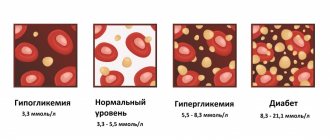Alloimmune antibodies are one of the most important erythrocyte antigens that are synthesized by the body during sensitization to Rh factor proteins and some other protein compounds contained on the membrane of erythrocytes.
For the appearance of these antibodies, specific conditions are required:
- Blood transfusion to an incompatible recipient.
- The period of pregnancy when an Rh-negative woman carries a fetus with a positive Rh status.
The Rh system consists of 5 main antigens and many additional ones; antigen D is considered the most active. There are other antierythrocyte antigens that are not part of the Rh factor, but are of clinical importance. They can cause dangerous complications during pregnancy and blood transfusions.
Study Information
The Rh factor and other immunogenic proteins of the erythrocyte membrane are inherited. The majority of the population (about 85%) belongs to the group of Rh-positive, that is, these specific proteins are present in the membrane of their blood cells. In a certain number of people they are not synthesized; they are classified as Rh-negative.
The absence or presence of the Rh factor does not in any way affect the general condition of a person. But situations may arise when an Rh-negative woman becomes pregnant with an Rh-positive child. In this case, there is a risk that the mother’s body will begin to produce antibodies against the baby’s blood. The result can be hemolytic disease of the newborn, miscarriage, and a number of other complications of pregnancy.
During the first pregnancy, the risks for the child are small, but the antibodies persist for a long time. The risk of Rh conflict increases rapidly with each subsequent pregnancy. Antibodies circulate in the blood for a long time and freely penetrate the placental barrier. Determination of antibodies to Rh antigens of erythrocytes is a reliable, reliable method for detecting the likelihood of Rh conflict in the early stages of pregnancy.
The presence of high antibody titers may be the cause of hemolytic disease. In this disease, antibodies from the mother's blood penetrate into the fetus and destroy red blood cells in the child's blood. As a result, hemolytic jaundice develops, affecting the kidneys, liver, and other organs of the newborn.
The analysis allows you to determine the presence of antibodies in the early stages of pregnancy, monitor the dynamics of the development of the process, and promptly prescribe appropriate treatment.
This test is also used before blood transfusion to determine the potential incompatibility of the donor’s blood with the recipient’s Rh system. Especially if the patient has previously received a blood transfusion.
The analysis is carried out using the method of agglutination, that is, gluing. It implies that the presence of specific antibodies in the blood will manifest itself when it is mixed with the corresponding antigens. Red blood cells will stick together and precipitate. If agglutination occurs, the analysis is considered positive; if not, it is considered negative.
The immune response of a woman’s body to blood cell antigens inherited by the fetus can lead to the development of hemolytic disease of the newborn (HDN), neonatal immune thrombocytopenia and leukopenia, and cause premature termination of pregnancy and infertility [1, 3, 9]. Adequate prevention and treatment of these pathological conditions is impossible without timely diagnosis of immunoconflict between mother and fetus, establishing the specificity and titer of alloantibodies [4, 5, 8, 10]. In addition, every pregnant woman should be considered as a potential recipient of hemocomponent therapy and, in the presence of allosensitization, needs an individual selection of immunologically compatible blood components [2, 7, 11].
The purpose of the study was to determine the clinical significance of immunohematological monitoring in women of reproductive age.
The objectives of the study were to study the prevalence of immune antibodies to erythrocyte and leukocyte antigens (HLA), to establish the role of identified antibodies in the development of hemolytic disease of the newborn and premature spontaneous termination of pregnancy.
Material and methods
An immunohematological examination was carried out on 1850 married couples planning to have a child. Detection of immune (IgG) antibodies to antigens of the AB0 system was carried out using a 5% solution of unithiol (Na 2,3-dimercaptopropanesulfonate) in an agglutination reaction in accordance with Methodological Letter of the Ministry of Health of the Slovak Republic of the Russian Federation No. 15-4/3118-09 [6]. The study of antierythrocyte alloantibodies to Rhesus, Kell, MNSs, etc. antigens was carried out in an indirect antiglobulin test in a gel with a panel of 3 test erythrocyte samples. If antibodies were present in the blood serum, their specificity was determined using 11 samples of test red blood cells. The antibody titer was taken to be the value of the highest serum dilution in which agglutination was clearly visible. Anti-lymphocyte antibodies (anti-HLA) were determined in a standard complement-dependent microlymphocytotoxicity test.
Results and discussion
The study of immune antibodies to antigens of the AB0 system was carried out in the presence of a theoretical possibility of AB0 incompatibility in a particular married couple. IgG antibodies were detected in 350 (41.1%) of 851 women examined. At the same time, anti-A antibodies were detected significantly more often (47.3%) than anti-B (34.1%) ( p
<0,05).
The dependence of the occurrence of tension-type headache on the titer of immune antibodies anti-A, anti-B was studied based on the analysis of data from laboratory and clinical examinations of 283 married couples with children. Symptoms of TTH at birth were diagnosed in 57 (20.1%) children (Table 1)
.
At the same time, antibodies of a specificity other than AB0 were not detected in the blood serum of these women. The incidence of TTH development directly correlated with the antibody titer ( p
<0.01). With an antibody titer of 1:4, clinical manifestations of HDN were observed in 25% of children. The presence of immune antibodies in women at a titer of 1:8 or higher led to the development of tension-type headache in more than 70% of cases.
Screening of anti-erythrocyte alloantibodies in the indirect antiglobulin test was carried out in blood samples of 1850 women. Allosensitization was detected in 7 (0.86%) of 811 examined women with Rh-positive blood and in 53 (5.1%) of 1039 women with Rh-negative blood. The results of antibody identification are presented in table. 2
.
When analyzing the dependence of the development of Rh(D) sensitization on the number of pregnancies in women's history, it was found that the first pregnancy leads to the initiation of an immune response to the D antigen in 0.91% of women, and each subsequent pregnancy increases the likelihood of antibody formation. In women with a history of 5 or more pregnancies, Rh sensitization is 17.11%. Significant differences were found in the frequency of detection of antibodies in women who had one pregnancy, who had 2-4 and 5 pregnancies or more ( p
<0,01)
(Table 3)
.
The titer of antierythrocyte alloantibodies varied from 1:2 to 1:32,000 and did not depend on the number of pregnancies. An increase in antibody titer during pregnancy was observed in 21.4% of those examined, titer fluctuations (including after sessions of therapeutic plasmapheresis) - in 35.8%, a decrease without plasmapheresis - in 7.1%, titer without changes - in 35.7 % of sensitized women.
The dependence of the formation of anti-D antibodies on the ABO affiliation of the spouses was studied (Table 4)
.
Antibodies were detected in 26 (4.63%) of 562 women whose husbands were of the same group or compatible with them according to the AB0 system. In case of antigen A incompatibility, for example, the wife’s blood group is 0(I), the husband’s is A(II), D-immunization was established in 8 (3.32%) of the 241 women examined. When spouses differed in antigen B, Rh sensitization was detected in 12 (5.53%) of 217 cases. Statistical differences between groups were not significant ( p
>0.05). Thus, our results are not consistent with the hypothesis that the risk of developing allosensitization decreases when spouses are incompatible with AB0 antigens.
Of the 60 alloimmunized women, 18 (30%) had a history of giving birth to children with HDN, 14 (23.3%) had spontaneous abortion, and 3 (5%) were diagnosed with II infertility. The reason for the development of HDN was the presence of a titer of anti-D, -DC, -c, -E, -K antibodies (Table 5)
.
Anti-HLA antibodies were detected in 13 (0.7%) of 1850 women examined. The number of pregnancies in women's history was decisive in the development of HLA sensitization. During the first pregnancy, anti-HLA antibodies arose in 0.3% of women, in the 2nd-4th pregnancy - in 1.5%, with a history of 5 pregnancies or more - in 6.58% ( p
<0.05).
In women who were not pregnant, anti-HLA antibodies were not detected. The effect of anti-HLA antibodies on the course and outcome of pregnancy has not been established. In the group of HLA-sensitized women, premature spontaneous termination of pregnancy was recorded in 25% of cases, in the group of non-sensitized women - in 20% ( p
>0.05).
Thus, an immunohematological examination of married couples planning the birth of a child should include mandatory determination of the AB0 blood group and Rhesus status of both spouses, the study of immune antibodies to erythrocyte antigens of the ABO, Rhesus, Kell systems, etc. When identifying antibodies, it is necessary to determine their belonging to the class immunoglobulins, titer and specificity. The data obtained will make it possible to predict the risk of developing HDN and, if necessary, select compatible blood components for transfusion to both the newborn and the mother. The absence of anti-Rhesus antibodies in Rh-negative women is an indication for the prevention of sensitization by administering anti-Rhesus immunoglobulin after childbirth or premature termination of pregnancy.
conclusions
1. Immune antibodies (IgG) of the AB0 system are detected in 41.1% of women with AB0 incompatibility with their spouse.
2. The risk of developing hemolytic disease of newborns is associated with the titer of anti-A and anti-B antibodies, while a titer of 1:4 or higher can be considered diagnostic, at which HDN is observed in more than 25% of cases.
3. Alloantibodies to erythrocyte antigens of the Rh, Kell and other systems are found in 5.1% of Rh-negative and 0.86% of Rh-positive women of reproductive age.
4. The risk of Rh sensitization is directly dependent on the number of pregnancies in women’s history and does not depend on the ABO status of the spouses.
5. Anti-HLA antibodies were detected in 0.7% of women, but the effect of HLA sensitization on the course and outcome of pregnancy has not been established.
Do you need preparation for the study?
To conduct the study, blood is taken from a vein from the patient and given in the morning, on an empty stomach. Before the analysis, you are allowed to drink water, even coffee or tea should be excluded.
The day before the test, you need to avoid physical activity and not drink alcohol or fatty foods in large quantities. The time period between the last meal and blood donation is at least 8 hours. Before the test, you should not smoke, at least 30 minutes before the analysis.
Failure to follow the rules for preparing for analysis will greatly reduce the reliability of test results and increase the likelihood of false-positive reactions.
Prevention
Recommendations for preventing the development of blood group conflict:
- try to avoid abortions, as this increases the likelihood of complications during subsequent pregnancies;
- observe preventive measures against infection with infectious diseases (flu, hepatitis), which weaken the body of the expectant mother;
- undergo routine examinations during pregnancy in a timely manner;
- Be careful when carrying a baby so as not to provoke placental abruption.
Modern medicine has many means to prevent the development of blood group conflict. The specialists of the Mother and Child clinics will do everything possible to maintain the health of the expectant mother and baby.
What do the study results mean?
If the test result is negative, the likelihood of Rh conflict is low, no additional action is required. Repeated tests may be performed to exclude rare cases of false negative reactions.
Positive test results indicate the presence of specific antibodies in the blood. This indicates a high probability of Rh conflict. In this case, it may be necessary to prescribe measures to prevent hemolytic disease of the newborn and carefully select compatible donor blood.
In what cases does incompatibility occur?
An immunological conflict in the AB0 system can theoretically arise if the mother and baby have different blood groups, namely:
- the mother has group I or III, the child has group II;
- for the mother I or II, for the baby - III;
- the mother has group I, II or III, the child has group IV.
The most dangerous combination is group I in the mother and group II or III in the child. This situation will most likely lead to conflict and the development of hemolytic disease in the baby.
Group immunological conflict is possible in married couples with the following combinations of blood groups:
- woman with I, man with II, III or IV;
- woman with II, man with III or IV;
- woman with III, man with II or IV.
It is important to note that women with group I, regardless of the Rh factor, find it most difficult to achieve compatibility. The only optimal option is if the man and the fetus also have group I. If a man has a different group, the risk of developing an immunological conflict increases.
Women at risk include:
- received blood transfusions;
- have had several abortions or miscarriages;
- already having children with hemolytic disease or mental retardation.
Rhesus conflict. Prevention
Laboratory control of Rh immunization is carried out by determining Rh antibodies in the blood of a pregnant woman:
- If both the father and mother have Rh negative blood, it is not advisable to determine antibodies during pregnancy; — If the Rh-negative genotype of the fetus is determined based on the results of a non-invasive test, antibody determination is not carried out; — Rhesus immunization is determined when the antibody titer is 1:4 or more; — There is a risk to the fetus when the antibody titer is 1:16 or more; — Determination of antibodies is carried out upon registration, at 18-19 and 28 weeks, with the appearance and increase in titer - the frequency of studies increases. ⠀
Prevention of Rh immunization in Rh negative women
1) Administration of anti-Rhesus immunoglobulin 2) Preservation of the first and subsequent pregnancies, the woman should avoid abortion.
Anti-Rhesus immunoglobulin (antibody) protects against the immune reaction without having a negative effect on the fetus and newborn.
Application schemes
— A dose of 300 mcg is administered intramuscularly at 28 weeks of pregnancy (provided there are no antibodies in the blood) — If prophylaxis is not carried out at 28 weeks, it is carried out as soon as possible — Additional prophylaxis 125 mcg (I trimester) or 300 mcg (II, III trimester ) after invasive procedures during pregnancy (amniocentesis, chorionic villus sampling, cordocentesis, cervical suturing, embryo reduction), after abdominal trauma and after the appearance of bleeding
What else is worth knowing
- Prevention is also carried out in case of unsuccessful completion of pregnancy - instrumental or medical abortion, spontaneous miscarriage and intrauterine fetal death - After birth, the Rh factor of the child is determined and in the case of positive blood - the woman is administered 300 μl of immunoglobulin, no later than 72 hours after birth, with negative blood - prophylaxis is not carried out - The dose of immunoglobulin is increased in case of placental abruption, during cesarean section, during manual examination of the postpartum uterus - If for some reason prophylaxis after childbirth is not carried out, it is possible to administer immunoglobulin up to 10 days of the postpartum period.
Prevention is carried out to prevent immunization in the future, when carrying subsequent children.
Tactics for managing Rh-negative pregnant women
When registering a pregnant woman, the obstetrician-gynecologist prescribes a Rh factor test for the woman. The future father of the child must undergo a similar test or have confirmation of a previously completed test. If it turns out that the pregnant woman is Rh- and her husband is Rh+, then the pregnancy is monitored more closely: the woman is regularly tested for anti-Rh antibodies ( immunoglobulins M and G).
The first antibody test is taken after the pregnant woman is registered and her Rh factor is determined. If antibodies are detected, then the pregnancy is considered Rh-sensitized. In this case, antibody testing is carried out every month. Depending on the course of pregnancy, medical history, and antibody levels, a woman can be observed both in a antenatal clinic and in a specialized center, where further medical tactics are determined and the issue of the method and timing of delivery is decided.
If, after registration, no antibodies were detected in a woman, then she continues to be regularly tested for immunoglobulins M and G until delivery or until a prophylactic immunoglobulin injection at 28 weeks of gestation.
Complications in the development of blood group conflict
AB0 conflict can lead to the following complications:
- Slowing down the mental and physical development of the embryo.
- Risk of disorders in the development of the brain and cardiovascular system.
- Thickening of the umbilical cord and placenta.
- Fetal hypoxia.
- Hemolytic disease of a child, characterized by the appearance of edema, yellowing of the skin, and anemia.
Preventive measures
To prevent parental blood type conflicts, the following is recommended:
- Register for pregnancy as early as possible and take the necessary blood tests. And the best thing is to make an appointment with a gynecologist even before conception and undergo an examination to identify the risk of rhesus or blood group conflict.
- Complete the prescribed ultrasound scan at the required time, and do not miss appointments with the doctor.
- Lead a healthy lifestyle, follow a daily routine and proper nutrition.
- Take all necessary measures to protect against sexually transmitted infections.
- Use contraception to protect against unwanted pregnancy and abortion.
In the arsenal of modern medicine there are many means to prevent the development of such a disorder, so in most cases the health of the mother and newborn is not in danger.
We will be waiting for you at our International Hemostasis Clinic. We work at the address: Moscow, metro station Arbatskaya / Kropotkinskaya, B. Afanasyevsky lane, building 22. You can make an appointment using the online form or by calling: +7.










